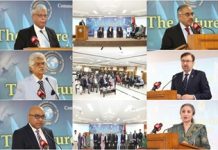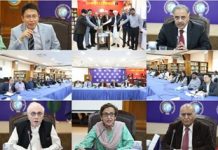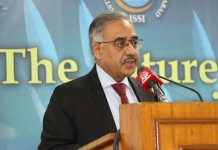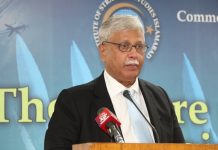Remarks by DG ISSI Ambassador Sohail Mahmood at International Conference on “Pakistan and the Region: Enhancing Regional Connectivity, Addressing Non-Traditional Threats, and Countering Terrorism”,
ISSI, 7 May 2025
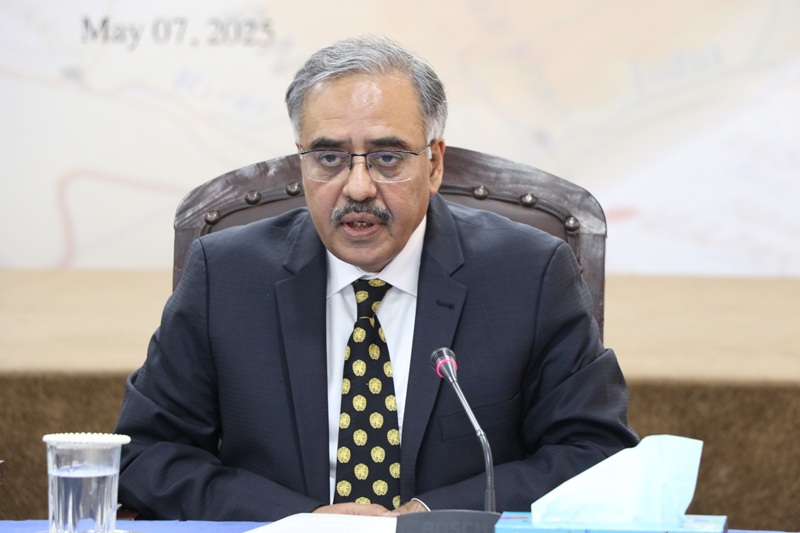
It is a distinct pleasure to welcome everyone to this International Conference, organized by the ISSI in collaboration with our long-standing partners, the Friedrich Ebert Stiftung (FES). The conference is part of the ongoing series of collaborative engagements between ISSI and FES, aimed at promoting deeper dialogue and understanding on shared challenges and the evolving regional dynamics.
I take this opportunity to express our sincere appreciation to FES Country Director Mr. Felix Kolbitz and Programme Advisor Mr. Humayoun Khan. I also thank our respective teams at CAMEA and FES for their valuable efforts in putting the conference together, all the way from concept to reality.
We are delighted to welcome Mr. Arno Kirchhof, Deputy Head of Mission at the Embassy of Germany in Islamabad, as keynote speaker. Pakistan highly values its relationship with Germany and the two countries have worked as partners to foster regional stability, particularly in the context of Afghanistan in recent years.
We are privileged to have a galaxy of eminent scholars, practitioners, and area specialists from Pakistan and abroad as part of our panels for the various sessions of the conference. Most have joined us in-person, some would be on-line. I welcome them all and we look forward to their rich, insightful contributions.
Last but not the least, it is an honour to have Senator Mushahid Hussain Sayed as the Chief Guest. He is gifted with that rare combination of a sharp intellect, piercing analysis, powerful articulation, and strategic forecast. It is always instructive to hear his perspective on the state of the world and its future trajectory. We look forward to having his views on the regional dynamics, which are equally compelling.
Distinguished participants,
Pakistan is located in what Henry Kissinger used to describe as the proverbial “tough neighborhood.” The region is beset with a whole host of traditional and non-traditional security threats and challenges. These are exacerbated by geo-political rivalries and the effects of major-power contestation. Many of the threats and challenges in the region are trans-national in nature and demand collaborative approaches for solutions. However, in several instances, trust deficit and lack of political will militate against the imperatives of thinking and working together. There are immense opportunities in the realms of regional cooperation, connectivity, economic integration, and shared prosperity. Yet, the drift towards such desirable outcomes is nearly imperceptible. How to translate this potential into reality continues to be one of the most formidable challenges of statecraft in the region. It is dialogues like today’s that help rally our collective wisdom, develop a common understanding, and find pathways for sustainable peace, security, and development. A shared vision for the future is indispensable, if our region is to fare better in today’s turbulent and rapidly transforming world.
Cognizant of the emerging realities, Pakistan has in recent years sought to institute two paradigmatic shifts in its strategic outlook: One, embracing the concept of ‘comprehensive security’ that puts premium on economic and human security; and, two, accentuating the pivot to geo-economics, while navigating the complex geo-politics. Pakistan’s foreign policy initiatives, in the region and beyond, are now largely influenced by this evolving approach. And positive results are emerging.
Pakistan’s all-weather strategic cooperative partnership with China remains solid as ever, and a vital factor of stability in the region. Notwithstanding the unusual episode of 2024, Pakistan-Iran relations continue to develop along a stable and cooperative path. In the SAARC region, ties with Sri Lanka, Nepal and the Maldives have traditionally been cordial, constructive, and expanding. Some real gains have been made in the relationship with Bangladesh since August 2024, and it has been invested with substantial economic content.
Pakistan’s engagement with Afghanistan has also witnessed a visible change in recent months. High-level exchanges have been revived and dialogue on various tracks from security to trade to people-to-people links is picking up pace. Cross-border terrorism poses the most severe challenge in this relationship. It not only affects Pakistan’s internal security but also has broader implications for regional stability and development. It is of utmost importance for the Afghan Interim Government in Kabul to ensure an acceptable solution of this issue. The dividends of such a solution would be enormous in terms of regional connectivity and Afghanistan serving as a land bridge between South Asia and Central Asia, with all attendant benefits of trade flows and energy corridors.
In the broader regional context, emerging threats such as the regrouping of terrorist outfits, the use of emerging technologies by non-state actors, and cross-border sanctuaries necessitate a recalibration of counter-terrorism approaches. A siloed approach will not work; what is required is enhanced regional cooperation, intelligence-sharing, and a firm commitment to dismantling terror networks.
Similarly, the non-traditional threat such as climate change requires a different approach. Recent heat waves across South Asia, intensifying water stress, and increased displacement due to environmental degradation strongly underscore that climate change is no longer a distant risk, it is a lived reality. The message is unmistakable: Our region needs a new paradigm that recognizes the inextricable link between peace, economic integration, environmental sustainability, and human security. It further underscore that regional cooperation is not a matter of choice, but of necessity.
Distinguished participants,
This conference is also taking place in the backdrop of heightened tensions between India and Pakistan, which have now turned into a live conflict. In the aftermath of the Pahalgam attack, India rushed to blame Pakistan without holding any worthwhile investigations and providing any credible evidence. It then followed up with a slew of measures, including putting the Indus Waters Treaty (IWT) in abeyance. While India’s action on the Treaty is legally untenable, its declaration not to let a drop of water flow to Pakistan is morally reprehensible. As the Indian security forces pounced on the Kashmiris inflicting collective punishment on them, there has been phenomenal rise in anti-Muslim hate speech across India. Meanwhile, the drum-beating and war-mongering by large segments of the Indian media, reinforced by bellicose statements by the Indian leadership, continued to mount bilateral tensions.
Pakistan responded in a measured manner, stressing that it will not initiate any conflict but would respond firmly to any aggression from India. Pakistan also made a reasonable proposal for a neutral, transparent and credible investigation. But India did not respond positively. For its part, the international community continued to express its deep concern over the evolving situation and stressed the need for de-escalation and maintaining peace and security. At Pakistan’s request, the UN Security Council deliberated on the matter on 5 May 2025. The UN Secretary General also offered his good offices.
In the dark of the night of 6-7 May, in an unprovoked and what has been described as a “blatant act of war,” India violated Pakistan’s sovereignty targeting several places in Pakistan and AJK. India’s act of aggression resulted in the martyrdom of civilians, including women and children. Pakistan has strongly condemned India’s cowardly action, which is in flagrant violation of the UN Charter, international law, and the established norms of inter-state relations. India’s reckless action has jeopardized regional peace and security and brought the two-nuclear armed states closer to a major conflict. Pakistan has said that it reserves the right to respond appropriately in accordance with Article 51 of the UN Charter. The government, armed forces, and people of Pakistan stand united in the face of Indian aggression. They will act with iron resolve to protect and preserve the sovereignty and territorial integrity of Pakistan.
Let me conclude by welcoming all the participants again, and wish very fruitful deliberations throughout the conference.
Thank you.
Pakistan Zindabad




